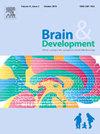COVID-19 infection and vaccination in children with Dravet syndrome or infantile epileptic spasms syndrome: An internet survey in Japan
IF 1.3
4区 医学
Q4 CLINICAL NEUROLOGY
引用次数: 0
Abstract
Background
This study aimed to clarify the status of coronavirus disease 2019 (COVID-19) infection and vaccination among children with infantile-onset drug-resistant epilepsy through an internet survey involving Dravet syndrome (DS) and infantile epileptic spasms syndrome (IESS) family associations.
Methods
A web-based survey was conducted between October and November 2023, targeting parents of children aged ≤15 years with DS or IESS who were members of the Dravet Syndrome JP or West Syndrome JP family associations, covering patient characteristics, COVID-19 infection, and vaccination.
Results
A total of 151 and 112 responses were obtained. COVID-19 infections occurred in 68.2 % and 52.7 % of DS and IESS cases, respectively. Fever-triggered seizures were reported in 61.8 % of DS and 3.6 % of IESS cases. Among DS cases, 22.8 % (8.0 % vaccinated), 36.6 % (20.0 % vaccinated), and 34.0 % (16.0 % vaccinated) required temporary visits for seizure exacerbation, emergency visits for seizure clusters/status epilepticus, and seizure-related hospitalizations, respectively. Vaccination rates were 25.3 % for DS and 17.3 % for IESS. Post-vaccination fever-triggered seizures occurred in 2.9 % and 3.5 % of DS cases after the first and second doses, respectively, and 0.0 % of IESS cases. Among DS cases, temporary visits were required in 2.9 % and 0.0 %, emergency visits in 0.0 % for both doses and hospitalizations in 2.9 % and 3.5 %, respectively. Vaccine hesitancy arising from seizure concerns was reported by 66.4 % and 23.0 % of DS and IESS caregivers, respectively.
Conclusion
COVID-19 vaccination is well-tolerated and may lower seizure risks in children with DS. However, caregivers should monitor those with a history of fever-triggered seizures.
Dravet综合征或婴儿癫痫痉挛综合征儿童的COVID-19感染和疫苗接种:日本的一项网络调查
本研究旨在通过网络调查,了解婴儿期耐药癫痫患儿的2019冠状病毒病(COVID-19)感染状况和疫苗接种情况,调查涉及Dravet综合征(DS)和婴儿癫痫痉挛综合征(IESS)家族关联。方法于2023年10月至11月对年龄≤15岁的DS或IESS患儿的父母进行网络调查,调查对象为Dravet综合征JP或West综合征JP家庭协会成员,涵盖患者特征、COVID-19感染情况和疫苗接种情况。结果共获得151份问卷和112份问卷。DS和ess病例的新冠肺炎感染率分别为68.2%和52.7%。61.8%的DS和3.6%的IESS病例报告了发烧引发的癫痫发作。在DS病例中,分别有22.8%(8.0%接种疫苗)、36.6%(20.0%接种疫苗)和34.0%(16.0%接种疫苗)因癫痫发作加重、癫痫发作集群/癫痫持续状态和癫痫相关住院而需要临时就诊。DS和IESS的接种率分别为25.3%和17.3%。接种后发烧引发的癫痫发作在第一次和第二次接种后分别发生在2.9%和3.5%的DS病例中,在IESS病例中发生在0.0%。在退行性休克病例中,2.9 %和0.0%的患者需要临时就诊,2.9 %和3.5%的患者需要紧急就诊。由癫痫发作引起的疫苗犹豫分别有66.4%和23.0%的DS和iss护理人员报告。结论covid -19疫苗耐受性良好,可降低DS患儿癫痫发作风险。然而,护理人员应该监测那些有发烧引发癫痫发作史的人。
本文章由计算机程序翻译,如有差异,请以英文原文为准。
求助全文
约1分钟内获得全文
求助全文
来源期刊

Brain & Development
医学-临床神经学
CiteScore
3.60
自引率
0.00%
发文量
153
审稿时长
50 days
期刊介绍:
Brain and Development (ISSN 0387-7604) is the Official Journal of the Japanese Society of Child Neurology, and is aimed to promote clinical child neurology and developmental neuroscience.
The journal is devoted to publishing Review Articles, Full Length Original Papers, Case Reports and Letters to the Editor in the field of Child Neurology and related sciences. Proceedings of meetings, and professional announcements will be published at the Editor''s discretion. Letters concerning articles published in Brain and Development and other relevant issues are also welcome.
 求助内容:
求助内容: 应助结果提醒方式:
应助结果提醒方式:


